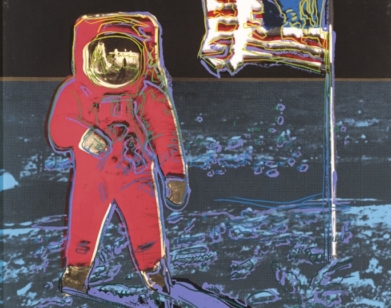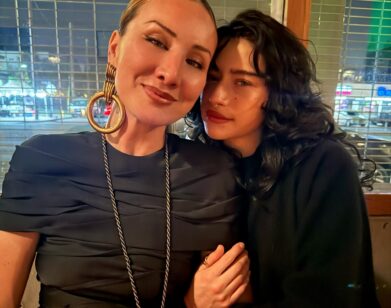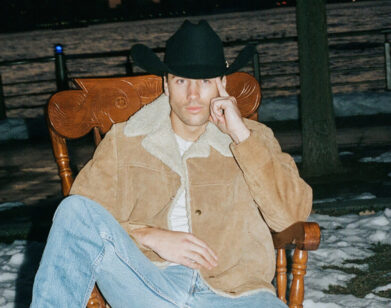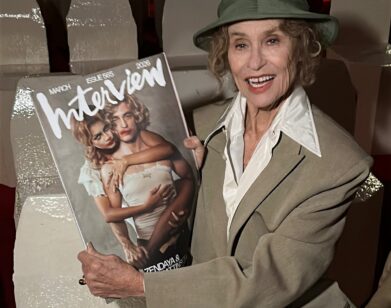ET
Meet Jeremy Corbell, the Citizen Journalist Blowing the Whistle on UFOs
25 years after witnessing three mysterious orbs zipping around the night sky like cocaine-crazed hummingbirds looking for something to kill, I found myself texting with Jeremy Corbell, the undisputed poster-child for the movement to expose what the U.S. government knows about UFOs. This was no accident. Since I was nearly obliterated in a highway collision as dozens of drivers slammed on their brakes at the sight of a frantic pack of physics-defying Unidentified Anomalous Phenomena (that’s what “they’re” calling UFO’s now), I’ve been on a feral quest for interstellar enlightenment. Corbell, the privileged sounding board for scientists, politicians and U.S. intelligence officers steeped in arcana, is as close to a galactic guru that anyone with my limited security clearance was going to get. He’s spent years trying to peel back the skin of the celestial boogeyman, to uncover the secrets of the universe, and to learn, above all else, why aliens are visiting Earth and what they find so goddamn interesting about a society of dumb-dumb humans who celebrate war, intolerance, and the return of the McRib.
As the investigative filmmaker behind highly acclaimed documentaries like Bob Lazar: Area 51 and Flying Saucers, and co-host of the Weaponized podcast alongside legendary journalist George Knapp, Corbell has become the unwitting confidant of those looking to divulge details of disco volante. Recently, I sat down with him to discuss the social and religious implications of a global extraterrestrial reveal and whether or not concealing the truth is a violation of the First Amendment (or simply a way of protecting society from an unfathomable darkness).
———
MIKE ADAMS: How are you doing, bud?
JEREMY CORBELL: Good man. About to jump on a jet plane and get to work.
ADAMS: Oh, yeah?
CORBELL: A normal plane.
ADAMS: Right on. Where are you headed?
CORBELL: I’m meeting up with George [Knapp]. We got a couple days of work at his place, meeting up with [Bob] Lazar and a couple other people.
ADAMS: Right on. Jeremy, how did you become the rockstar of the UFO community?
CORBELL: Is that what I am?
ADAMS: You’re the face.
CORBELL: The punching bag.
ADAMS: Maybe that’s true.
CORBELL: It wasn’t intentional. I got curious like everybody else, and I saw this space before it was cool. It was very fringe and I was intrigued like every other person. I heard Bob Lazar on the radio with George Knapp and I went on and did my martial athletics and my art career and never thought I would participate in it. I was not trained as a journalist. I got super ill and couldn’t physically continue doing Jujitsu the way I had before. I was given a camera and I pointed it at somebody and they spilled the beans, and I was shocked. This camera became my passport into all these questions that I wanted answers to, and that was just kind of how it started for me. I wasn’t a filmmaker, never studied film. It was a way for me to talk with people and try to understand this conundrum, this pesky UFO thing that won’t go away.
ADAMS: Did you have an experience yourself?
CORBELL: No, it was just curiosity. If you can put yourself in the mind of a 13-year-old kid in 1989, I always thought, “Wow, there’s something out there.” I mean, they’re telling us the universe is vast and that nobody’s coming here because the distances are so beyond time and space. And I bought that. I was like, “Wow, that’s too bad.” Then I heard Lazar describe the propulsion system that he said he worked on and that instantaneously flipped my script. I thought, “Look, if this guy’s telling the truth, then that annihilates this concept of travel through space and time.” It completely changed the idea of are they coming here?—which is that conversation we’re just now starting to have. If we have all this evidence, then, yeah man, somebody’s coming here.
ADAMS: There’s no doubt UFOs are real. We have witnesses that say these are not military craft, they’re not ours or anyone else’s. What do you know about UFOs that the general public doesn’t but should?
CORBELL: I personally don’t have the luxury of disbelief. I can’t sit there and say that none of this is happening, that it’s a mass hallucination or it’s some government conspiracy trying to convince you of something for money or war. It’s none of that. The reason I can tell you that is because everybody that’s interested in this has collectively fought for every millimeter, every inch. You can go through history and see the ways that we’ve been lied to about this subject. Starting with Project Sign and Project Grudge, and then Project Blue Book, ending in 1969, they said, “nothing to see here.” A huge moment for me was the document trail. You have all these people that are actually seeing things and experiencing things. You’ve got this preposterous, preponderance of evidence that something is going on that includes vehicles of unknown origin that can outpace, outmaneuver, and over-perform anything that the United States military has created. I’m jumping in and learning journalism as I go, but we’ve broken some big-ass and pretty profound stories.
ADAMS: Let’s talk about David Grusch for a second. Why is he so important to the UFO conversation right now?
CORBELL: David Grusch was hired by the UAPTF [Unidentified Anomalous Phenomena Task Force] and was assigned to look at these special access programs [SAPs]. The goal of that was to see, do we have these secret programs on UFOs? He had access to over 2,000 of them. He found absolute evidence. He interviewed 40 witnesses, and all of this was internal. He didn’t just say, “Trust me, bro.” He went to the Inspector General of the intelligence community and he’s like, “This is what I found, and this is all being covered up. In fact, I have been experiencing what they call reprisal.” Because he dug into this, he’s being threatened physically, his job and his status. So he came to me and George Knapp to not report. Imagine the frustration. We want to shout this information out, but more importantly, you’ve been given information in confidentiality and its purpose is to protect an individual. We wanted to get him to testify publicly, even though he’s limited in what he can say. You saw that on your TV screen. There he is saying, “We have crafts, UFOs. We’ve been reverse-engineering them. We’ve been exploiting them for derivative technologies. In those crafts were pilots and we call them non-human intelligence.” Biologicals, not humans. If David Grusch is telling the truth about what he found, it’s absolutely game-changing because it is now public record. If his importance is revealed, he’ll encourage other people to come forward as whistleblowers. The dam is breaking, the egg is cracking, something is going to come from this.
ADAMS: So, it’s safe to say that someone got up to go to work this morning and worked on alien tech and maybe examined alien corpses?
CORBELL: Straight up.
ADAMS: After that hearing, I thought it was interesting that NASA came forward weeks later and said, “While we know there are UFO sightings, we don’t know that they’re extraterrestrial in origin.” What’d you think about that statement?
CORBELL: I think it’s great that that stigma is reducing to the point where people are getting involved. If I’m to be critical of it, I would say the problem with NASA is that they have no access to anything classified. What are the best sensors? Who has the best archive of information when it comes to UAPs or UFOs? It happens to be our military, and that’s maybe because a lot of the UAP activity is around our nuclear armaments, but also just because they have the best sensors. There’s all this information on UAP that is over-classified. Maybe there’s something super dark and serious, I don’t know. I’ve been told before that you don’t want to kick this lying dog.
ADAMS: Don’t you think NASA would have some kind of idea about this? Or are they just lying too?
CORBELL: Look, I’m glad to see scientists at NASA taking this seriously and working on it on an unclassified level. It’s great that scientists are now, with reduced stigma, allowed to say, “What’s up with UFOs?” But it’s so tremendously baseline. We have high fidelity imagery. I have seen high fidelity footage from our military through leaks, stuff that you can’t put out or you’re in big trouble. I don’t know what NASA is going to tell us that we don’t already know.
ADAMS: What was interesting about that hearing was that there were only a handful of people watching live. I thought, this is the most telling revelation of my time and it seems like no one gives a shit. Why is everyone so cavalier about UFOs and aliens these days as opposed to in the fifties?
CORBELL: It’s hard to say. We’re living in a different age where we see things evolve so fast. Big ideas happen all the time. We’ve seen coverups, we’ve seen conspiracies, we’ve seen the most outrageous stuff. I mean, if I were an alien, I would come down to Earth and be like, “This is the greatest show in the solar system.” So I think with the speed at which society is adapting to and experiencing things, it’s almost like, “Oh yeah, aliens probably do exist, or UFOs maybe non-human or non-terrestrial stuff.” But a hearing like that helps translate it to the public, to the average person.
ADAMS: Let’s say the government is keeping this secret because they’re afraid of how the public will react. If the public doesn’t give a shit, why should they?
CORBELL: The entire architecture of secrecy is how I understand it from talking with people that ran the programs. When Senator Harry Reid was trying to get a special access title for AAWSAP [Advanced Aerospace Weapon System Applications Program], which is the true name of the UFO program, it was so that he could get the group to connect with the materials groups that have some of the saucers and share information. It’s a crime against the scientific community, if not human beings, if this is true, that we’ve been contacted by an intelligent group, probably not from here on Earth. I think we’re at that precipice. But I don’t know if I want to be a part of this sometimes, because what if what we’re trying to find out is so hardcore, and really smart people are like, “we should keep this secret.” But nobody can hold information back that has to do with the nature of existence. Not only do we have a right to know, I feel that we have a need to know, and I personally feel a duty to find out as much as I can.
ADAMS: I was talking to Lucien Greaves, whose organization fights to protect free speech. He says that it is a violation of free speech to keep UFOs a secret because it’s in the interest of public safety. What do you say to that?
CORBELL: It goes far beyond that. This is not just a matter of free speech. If it is true, this is a matter of an absolute reorientation of what it means to be a human being on planet Earth beyond borders.
ADAMS: You mentioned earlier that the government’s already admitted we have UFOs. Decades ago there was a documentary, Past, Present, and Future [1974]. The U.S. Air Force training manual mentions what, four alien civilizations? Those are telling admissions.
CORBELL: As a filmmaker, I got to give a shout out to UFOs: Past, Present, and Future [1974]. They actually got Rod Sterling of the Twilight Zone to narrate the film. It is absolutely incredible. Because it was fully funded by the CIA, it’s the closest thing we ever got to a touch of this disclosure. This is something that has been with us a long time. There appears to have an observational nature to it, but there’s also some sort of contact that people have been reporting for generations and generations.
ADAMS: Somewhere along the way, the government said, “In God We Trust.” I’ve heard theories suggesting that the shroud of secrecy on UFOs is rooted in the fact that, if we say, “there are aliens, there are extraterrestrials,” it discounts god as Christians know it, thereby destroying this whole monotheistic blueprint of the United States. Have you heard any substantiations to this claim?
CORBELL: With human beings, you’re going to get everything from religious pushback or even worshiping a new kind of E.T. Jesus and everything in between. Ultimately, none of it matters if we don’t have a consensus reality on this. We have to get there in order to even have these debates. And when that’s being obfuscated from the American public, then we can’t even talk about what reality is or even debate it. That’s what I’m fighting for. I’m going to push as hard as I can to crack this open. A lot of people are, it’s not just me.







